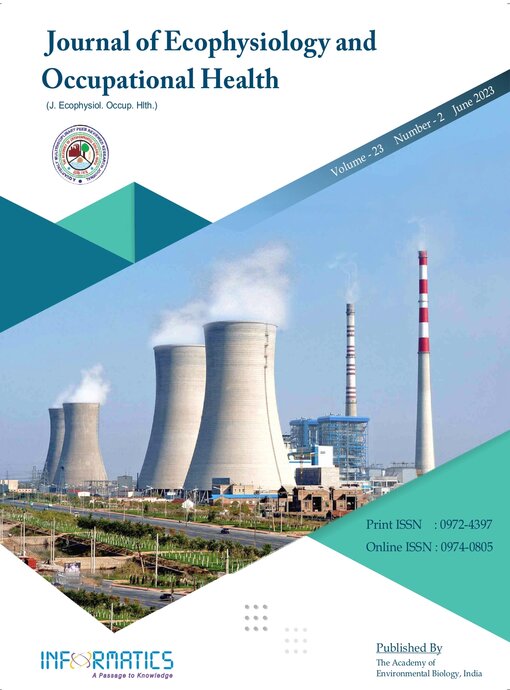Relationship between Learning Approaches and Students’ Preferences for Online Learning
DOI:
https://doi.org/10.18311/jeoh/2023/31674Keywords:
Computer Skills, Learning Strategies, Medical Education, Problem-Based Learning (PBL)Abstract
Objectives: The objective of this study is to enhance the quality of medical education by exploring the learning approaches of students and their relationship with the student’s preference for online learning in a Problem-Based Learning (PBL) Program. Subjects and Methods: The study was a descriptive, cross-sectional one; the target population included a random sample of students in the 1st, 2nd and 3rd years (n = 300). The study was conducted at the Faculty of Medicine, Suez Canal University in Ismailia, Egypt during the academic year 2021-2022. The instrument used for data collection is named “a Two-Factor Study Process Questionnaire (R-SPQ-2F)” (Arabic Version). Results: In this study, the students mostly adopt deep learning strategies (72.3%) compared to superficial learning strategies (27.7%). The current study shows that females mostly adopt deep learning strategies (75.8%) compared to males who adopted deep learning strategies (68.7%). The results of the correlation test in the current study show that learning approaches significantly correlated with gender and skills, also only computer skills and year were significantly correlated with the preferences of the students of distance learning. We conducted a correlation analysis with the subscales of the questionnaire with the preference of the students of distance learning. The only significant one is the first item of the questionnaire. Conclusion: In conclusion, the results of this research show that students in a PBL school adopt a deep learning approach. Older students with good computer skills prefer online learning to face-to-face learning more than younger ones do. In addition, students prefer online learning to increase their satisfaction in their time of studying, and there is a significant relationship between their computer skills and the learning approach.
Downloads
Metrics
Downloads
Published
How to Cite
Issue
Section
License
Copyright (c) 2023 Nahla Hassan, Samar ElAlfy, Shimaa ElAraby

This work is licensed under a Creative Commons Attribution 4.0 International License.
Accepted 2023-06-16
Published 2023-06-16
References
Emilia O, Bloomfield L, Rotem A. Measuring students’ approaches to learning in different clinical rotations BMC Medical Education. 2012; 12:114. https://doi.org/10.1186/1472- 6920-12-114 PMid:23153333 PMCid:PMC3527326 DOI: https://doi.org/10.1186/1472-6920-12-114
Jürgens S, Emilia O, Widyandana. Relationship between learning approach and motivation to learn among medical students at Universitas Gadjah Mada. Journal of Medical Education and Health Professions. 2009; 4:1.
May W, Chung E, Elliott D, Fisher D. The relationship between medical students’ learning approaches and performance on a summative high-stakes clinical performance examination. Medical Teacher. 2012; 34:236-41. https://doi.org/10.3109/0142 159X.2012.652995 PMid:22455715
Chonkar SP. The predominant learning approaches of medical students. BMC Medical Education. 2018; 18(1): 1-8. https://doi.org/10.1186/s12909-018-1122-5 PMid:29347934 PMCid:PMC5774125 DOI: https://doi.org/10.1186/s12909-018-1122-5
Inayat H, Ahmad Z. Effect of learning approaches on student’s academic achievement. Recent Advances in Statistics. 2011; 295.
Dolmans DHJM, Loyens SMM, Marcq H, Gijbels D. Deep and surface learning in problem-based learning: A review of the literature. Adv Health Sci Educ Theory Pract. 2016 Dec; 21(5):1087-1112. https://doi.org/10.1007/s10459-015-9645-6 PMid:26563722 PMCid:PMC5119847 DOI: https://doi.org/10.1007/s10459-015-9645-6
Amin Z, Khoo E. Basics in medical education. Teaching and learning concepts. World Scientific Publishing Co. Pte. Ltd; 2003. p. 28-34.
Mattick K, Dennis I, Bligh J. Approaches to learning and studying in medical students: Validation of a revised inventory and its relation to student characteristics and performance Medical Education. 2004; 38(5): 535-43. https://doi.org/10.1111/j.1365- 2929.2004.01836.x PMid:15107087 DOI: https://doi.org/10.1111/j.1365-2929.2004.01836.x
Gurpinar E, Kulac E, Tetik C, Akdogan I, Mamakli SS. Do learning approaches of medical students affect their satisfaction with problem-based learning? Advan in Physiol Edu. 2013; 37:85-8. https://doi.org/10.1152/advan.00119.2012 PMid:23471254 DOI: https://doi.org/10.1152/advan.00119.2012
Reid W, Duvall E, Evans P. Can we influence medical students’ approaches to learning? Medical Teacher. 2005; 27(5):401-7. https://doi.org/10.1080/01421590500136410 PMid:16147792
Reid W, Duvall E, Evans P. Relationship between assessment results and approaches to learning and studying in year two medical students. Medical Education. 2007; 41:754-62. https:// doi.org/10.1111/j.1365-2923.2007.02801.x PMid:17661883 DOI: https://doi.org/10.1111/j.1365-2923.2007.02801.x
Zhang J, Peterson R, Ozolins L. Student approaches for learning in medicine: What does it tell us about the informal curriculum? BMC Medical Education. 2011; 11:87. https://doi.org/10.1186/1472-6920-11-87 PMid:22013994 PMCid:PMC3209448 DOI: https://doi.org/10.1186/1472-6920-11-87
Abraham RR, Vinod P, Kamath M, Asha K, Ramnarayan K. Learning approaches of undergraduate medical students to physiology in a non-PBL- and partially PBL-oriented curriculum. Adv Physiol Educ. 2008; 32(1): 35-7. https://doi.org/10.1152/ advan.00063.2007 PMid:18334566 DOI: https://doi.org/10.1152/advan.00063.2007
Reid W, Evans P, and Duvall E. Medical students’ approaches to learning over a full degree programme. Med Educ. 2012; 17:10. https://doi.org/10.3402/meo.v17i0.17205 PMid:22927717 PMCid:PMC3427928 DOI: https://doi.org/10.3402/meo.v17i0.17205
Groves M. Problem-based learning and learning approach: Is there a relationship? Advances in Health Sciences Education. 2005; 10:315-26. https://doi.org/10.1007/s10459-005-8556-3 PMid:16362620
Wilcha R. Effectiveness of virtual medical teaching during the COVID-19 Crisis: Systematic review. JMIR Med Educ. 2020; 6(2):e20963 https://doi.org/10.2196/20963 PMid:33106227 PMCid:PMC7682786
AlQhtani A, AlSwedan N, Almulhim A, Aladwan R, Alessa Y, AlQhtani K, Aldhafian O. Online versus classroom teaching for medical students during COVID-19: Measuring effectiveness and satisfaction. BMC Med Educ. 2021; 21:452. https://doi.org/10.1186/s12909-021-02888-1 PMid:34454493 PMCid:PMC8397601 DOI: https://doi.org/10.1186/s12909-021-02888-1
Atwa H, Shehata MH, Al-Ansari A, Kumar A, Jaradat A, Ahmed J, Deifalla A. Online, face-to-face, or blended learning? faculty and medical students’ perceptions during the COVID-19 Pandemic: A mixed-method study. Front Med. 2022; 9:791352. https://doi.org/10.3389/fmed.2022.791352 PMid:35186989 PMCid:PMC8850343 DOI: https://doi.org/10.3389/fmed.2022.791352
Liew SC, Sidhu J, Barua A. The relationship between learning preferences (styles and approaches) and learning outcomes among pre-clinical undergraduate medical students. BMC Med Educ. 2015; 15:44. https://doi.org/10.1186/s12909-015-0327-0 PMid:25889887 PMCid:PMC4414371 DOI: https://doi.org/10.1186/s12909-015-0327-0
Munshi FM, Al Rukban MO, Al-Hoqail I. Reliability and validity of an Arabic version of the revised two factor study process questionnaire R-SPQ-2F. J Fam Community Med. 2012; 19:33-
https://doi.org/10.4103/2230-8229.94010 PMid:22518356 PMCid:PMC3326768 DOI: https://doi.org/10.4103/2230-8229.94010
Wilcha RJ. Effectiveness of virtual medical teaching during the COVID-19 Crisis: Systematic review. JMIR Med Educ. 2020; 6(2):e20963. https://doi.org/10.2196/20963 PMid:33106227 PMCid:PMC7682786 DOI: https://doi.org/10.2196/20963
Schimming LM. Measuring medical student preference: A comparison of classroom versus online instruction for teaching PubMed. J Med Libr Assoc. 2008; 96(3):217-22. https://doi.org/10.3163/1536-5050.96.3.007 PMid:18654658 PMCid:PMC2479068 DOI: https://doi.org/10.3163/1536-5050.96.3.007
Beyaztaş Dİ, Senemoğlu N. Learning approaches of successful students and factors affecting their learning approaches. Education and Science. 2015; 40(179):193-216. https://doi.org/10.15390/EB.2015.4214 DOI: https://doi.org/10.15390/EB.2015.4214
Senemoğlu N. College of education students’ approaches to learning and study skills. Eğitim ve Bilim. 2011; 36(160):65-80.
Dolmans DH, Wolfhagen IH, Ginns P. Measuring approaches to learning in a problem-based learning context. International Journal of Medical Education. 2010; 1. https://doi.org/10.5116/ijme.4c50.b666 DOI: https://doi.org/10.5116/ijme.4c50.b666
Groves M. Problem-based learning and learning approach: Is there a relationship? Adv Health Sci Educ Theory Pract. 2005; 10(4):315-26. https://doi.org/10.1007/s10459-005-8556-3 PMid: 16362620 DOI: https://doi.org/10.1007/s10459-005-8556-3
Reid WA, Duvall E, Evans P. Can we influence medical students’ approaches to learning? Medical Teacher. 2005; 27(5):401-7. https://doi.org/10.1080/01421590500136410 PMid:16147792 DOI: https://doi.org/10.1080/01421590500136410
Emilia O. Students’ approach to learning. Jurnal Pendidikan Kedokteran dan Profesi Kesehatan Indonesia. 2006; 1(2):42-9.
Martin IG, Stark P, Jolly B. Benefiting from clinical experience: The influence of learning style and clinical experience on performance in an undergraduate objective structured clinical examination. Med Educ. 2000; 34:530-4. https://doi.org/10.1046/ j.1365-2923.2000.00489.x PMid:10886635 DOI: https://doi.org/10.1046/j.1365-2923.2000.00489.x
Haist SA, Witzke DB, Quinlivan S, Murphy-Spencer A, Wilson JF. Clinical skills as demonstrated by a comprehensive clinical performance examination: Who performs better - men or women? Adv Health Sci Ed. 2003; 8:189-99. https://doi. org/10.1023/A:1026072102739 PMid:14574044 DOI: https://doi.org/10.1023/A:1026072102739
Haq I, Higham J, Morris R, Dacre J. Effect of ethnicity and gender on performance in undergraduate medical examinations. Med Educ. 2005; 39:1126-8. https://doi.org/10.1111/j.1365- 2929.2005.02319.x PMid:16262808 DOI: https://doi.org/10.1111/j.1365-2929.2005.02319.x
Boulet JR, Van Zanten M, McKinley DW. Correlates of performance of the ECFMG clinical skills assessment: Influences of candidate characteristics on performance. Acad Med. 2003; 78:S72-4. https://doi.org/10.1097/00001888-200310001-00023 PMid:14557101 DOI: https://doi.org/10.1097/00001888-200310001-00023
May W, Chung EK, Elliott D, Fisher D. The relationship between medical students’ learning approaches and performance on a summative high-stakes clinical performance examination. Medical Teacher. 2012; 34(4):e236-41. https://doi.org/10.3109/0 142159X.2012.652995 PMid:22455715 DOI: https://doi.org/10.3109/0142159X.2012.652995
Subasinghe SD, Wanniachchi DN. Approach to learning and the academic performance of a group of medical students- any correlation. Stud Med J. 2009; 3(1):5-10.
Dodiya D, Vadasmiya D, Diwan J. A comparative study of flip classroom teaching method versus traditional classroom teaching method in undergraduate medical students in physiology. Natl J Physiol Pharm Pharmacol. 2019; 9:551-5. https://doi. org/10.5455/njppp.2019.9.0310829032019 DOI: https://doi.org/10.5455/njppp.2019.9.0310829032019
Demir Kaymak Z, Horzum MB. Relationship between online learning readiness and structure and interaction of online learning students. Educational Sciences: Theory and Practice. 2013; 13(3):1792-7.
 Nahla Hassan
Nahla Hassan








